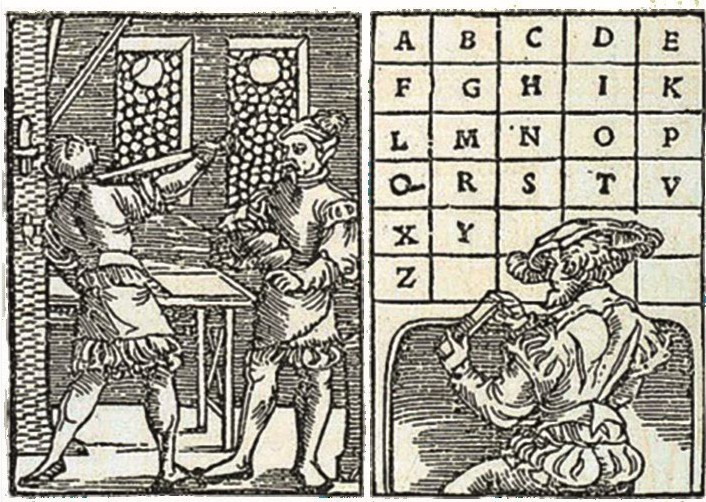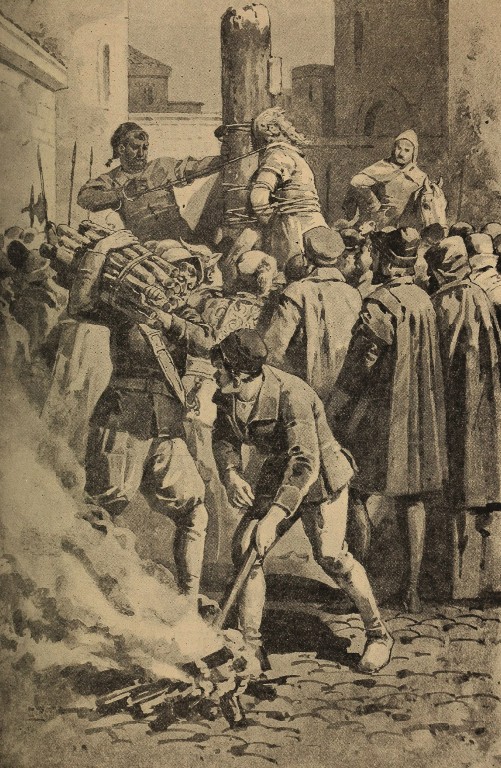Five hundred years ago a few brave men defied the authorities, and at the risk of capture and execution they began to use the new technology of the printing press to publish the Bible in English.
The Bible was written originally in three languages: the Old Testament was written mainly in Hebrew with some parts in Aramaic, and the New Testament entirely in Greek.
In 405 ad the priest and scholar Jerome finished his translation of the Bible into Latin. This became known as the Vulgate, or common version. It was the only Bible version permitted throughout much of Europe for many years. But after the fall of the Roman empire few people could speak Latin. In time the desire arose for the Bible in other languages, including English.
The English language had evolved sub-stantially. Prior to the Norman invasion of 1066 there had been in England several regional languages, such as Mercian and Anglo-Saxon, which developed into Early English. Following the Norman conquest, French was the official language until 1362. Afterwards the language which had developed mainly outside official circles came into its own, as Middle English.
Wycliffe
The first English translation of the Bible was made by the Leicestershire clergyman John Wycliffe and his associates, and completed shortly after Wycliffe’s death in 1384. It was translated into Middle English from the Latin Vulgate.
Wycliffe’s translation was banned in England, and possession of it was punishable by death. Despite this, such was the desire to read the Bible that copies were made commercially. More manuscript copies of Wycliffe’s Bible translations survive than copies of the works of his contemporary, the great English poet and author Geoffrey Chaucer—not bad for a forbidden book!
Tyndale
By the 15th Century, the English language had resolved into what is sometimes called Early Modern English. Most native English speakers today would be able to understand it. This was the language of the scholar and linguist William Tyndale. Whereas Wycliffe had translated from the Latin, Tyndale set himself the task of translating the entire Bible into English from the original languages. He was well suited to the task. He was said to be master of eight languages, and to speak each as a native. He was especially sensitive in his use of English, and where the language lacked an exact word, he invented it. For example, the words ‘beautiful’ and ‘scapegoat’ both originate from Tyndale’s Bible.
At that time the Catholic Church dominated the Christian world, and its teachings were given more prominence than the Bible itself. A clergyman once told Tyndale: “We had better be without God’s laws than the Pope’s!” Tyndale responded: “I defy the Pope and all his laws; and if God spares my life, ere many years, I will cause the boy that driveth the plow to know more of the Scriptures than thou dost!”
Threatened with execution in England, he moved to Germany. His translation of the New Testament was published in 1525—it was the first English translation from the original Greek, and the first to be printed.
He continued his work, turning his attention to the Old Testament which he translated from the Hebrew and Aramaic. He published the Pentateuch (the first five books of the Old Testament) in 1530, and the book of Jonah in 1531. He also published a revision of his New Testament in 1534. He started working through the rest of the Old Testament, but he only got as far as 2 Chronicles before he was ensnared, arrested and imprisoned. He was executed in 1536 by strangulation and then burning. His last shouted words were, “Lord! Open the King of England’s eyes.”
Coverdale
The previous year, the church reformer Miles Coverdale had published the first complete printed English Bible, probably in Antwerp. He incorporated Tyndale’s work, and translated the missing parts himself.
As Tyndale had prayed, the King of England’s eyes were opened. King Henry VIII approved the English translation, and only a year after Tyndale’s death Coverdale’s second edition of his Bible was dedicated to the king.
Tyndale’s work influenced translations into English for many years afterwards, including the seminal King James Version of 1611 which is still perhaps the most well known and loved Bible translation. There are probably now more translations of the Bible into English than any other language.
Wycliffe, Tyndale and others like them devoted their lives and risked everything to bring us the Bible in our language. Don’t you think you ought to read it?
Peter Banyard




